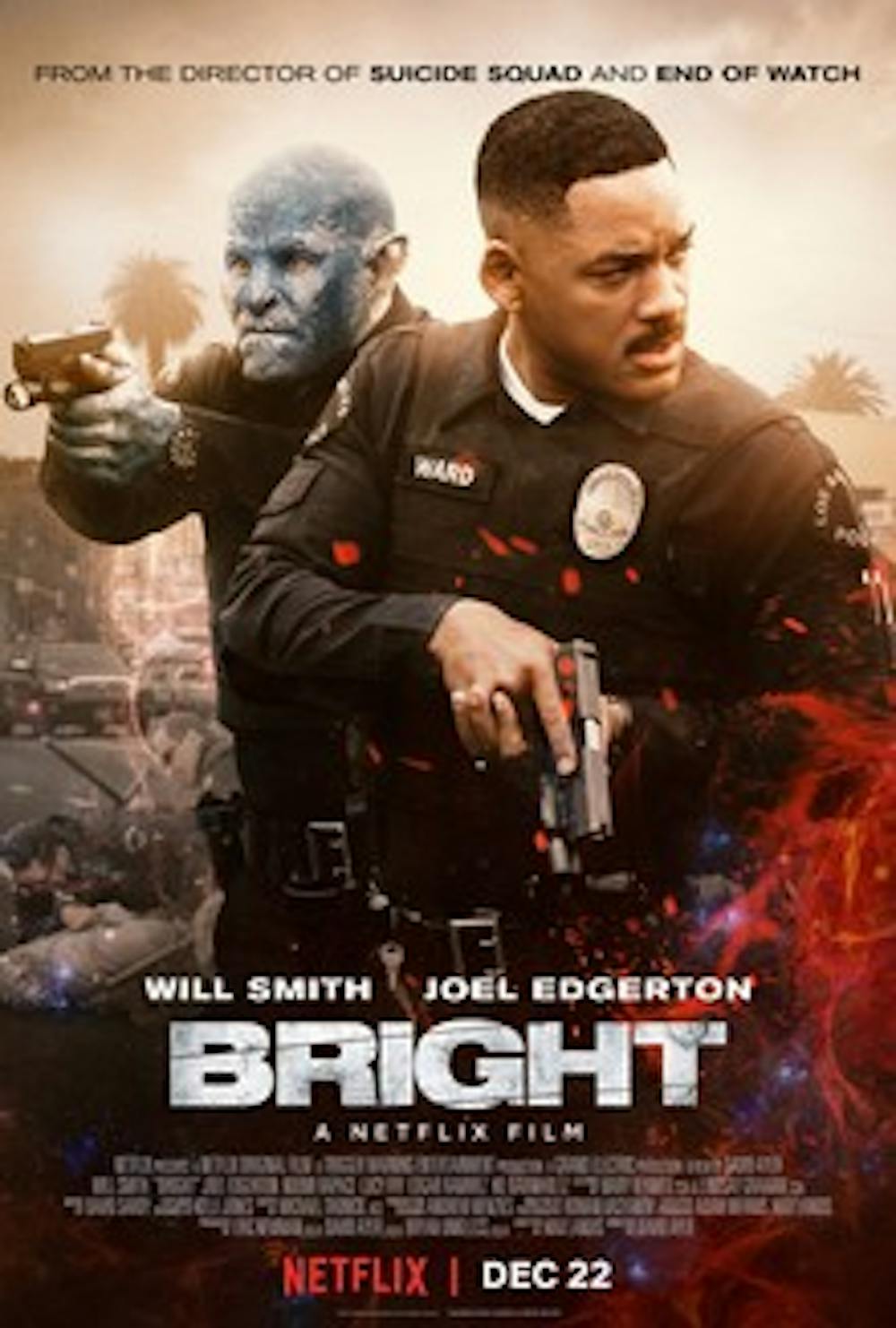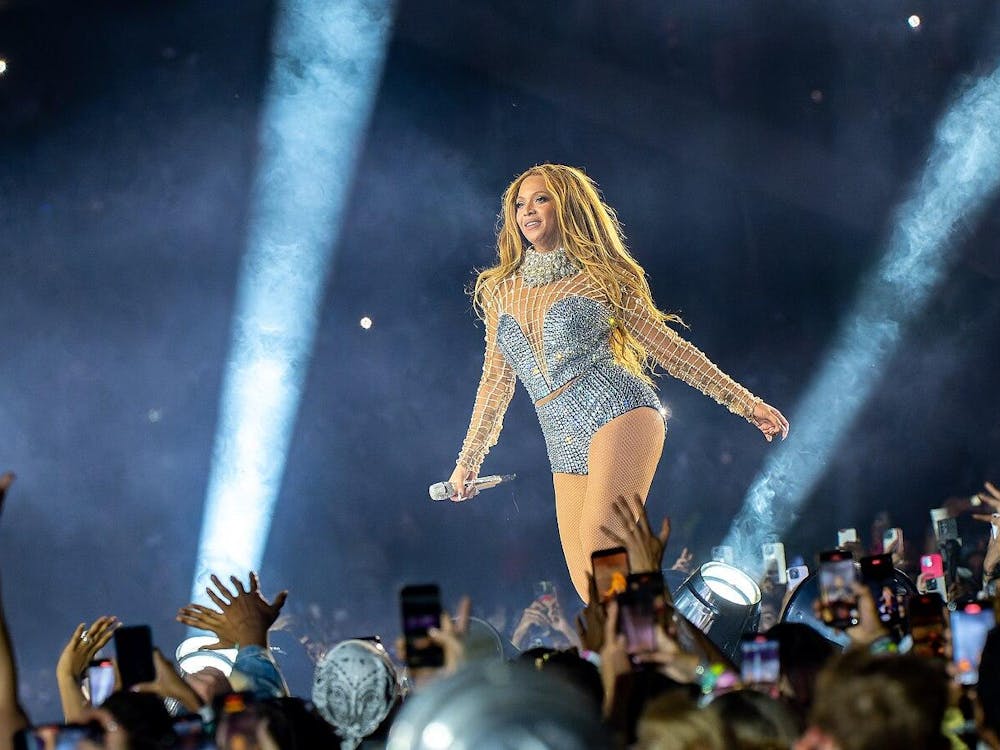As a film, “Bright” is many things — none of them good. It’s a cliché-ridden buddy cop dramedy. It’s a hacky, thinly written sci-fi/fantasy genre flick. It’s a ham-fisted racial allegory attempting to address the tense relationship between the police force and working class minorities in Los Angeles.
For Netflix, which produced “Bright”, the film represents the company’s first significant attempt at releasing a “big budget” project — 90 million dollars — as well as Netflix’s first attempt at competing with the larger production houses in Hollywood. For Will Smith, “Bright” was supposed to be a much needed win as an aging star who hasn’t appeared in a single good movie in over a decade.
These clashing influences and interests are the movie’s biggest problems, stymieing any potential originality to such an extent that the final product is a bland and cynical slurry. Directed by David Aye, coming off a bit of a stinker himself with “Suicide Squad,” and written by Max Landis (“Chronicle”, “American Ultra”), the film follows Officer Daryl Ward (Smith) and his orc partner Nick Jakoby (a makeup-caked Joel Edgerton) through a series of misadventures set in a fantastical version of Los Angeles rife with elves, fairies and other mythological “races.”
This being a bad movie with fantasy elements, there is a vaguely articulated prophecy in which Jakoby and Ward figure prominently as well as a wish granting magical device MacGuffin that drives movie’s conflict. But despite all these confusing elements, “Bright” is a police movie above all else. The buddy-cop relationship between Jakoby and Ward is placed front and center throughout the entirety of the plot.
Jakoby, as the viewer is told, is a rookie cop and the first orc police officer in the LAPD, a state of being which makes him the target for cartoonish incidents of anti-orc racism, originating from many of the human police officers. Meanwhile, Ward is a veteran member of law enforcement, just months away from retirement — of course — and is less than enthused to be paired with such an inexperienced and controversial partner.
As the film unfolds, it becomes increasingly clear that it is the movie’s goal to teach the audience a lesson in tolerance by charting the evolving relationship between Jakoby and Ward as the films depicts the intolerance Jakoby and orcs in general are treated with by society. In spite of the obvious existence of these lofty moral goals, their implementation is flubbed to such a degree that the film often comes across as being profoundly ignorant as opposed to enlightened when dealing with issues of race.
In the first place, it seems odd that “Bright” would choose to utilize hideous tusked creatures as a stand in for oppressed minorities. This issue is only exacerbated by the manner in which most of the orcs are depicted in the context of the film, as being a brutish, primitive and mostly unintelligent race of creatures when compared to their human and elven counterparts. Even as the film is clearly sympathetic to the plight of orcs as indirect victims of racism and police brutality, it still goes out of its way to paint orcs as confirming all of the stereotypes attributed to them.
Perhaps the questionable politics of the film would have been slightly easier to overlook if the rest of the film wasn’t done so poorly as well. At his best, Smith can be a charismatic comedic actor, as evidenced by performances in films such as “Men in Black” and “Bad Boys.” Although there are no shortage of one-liners in “Bright” for Smith to riff off of, the quality of said one-liners is mostly lacking in humor and creativity. This shows in Smith’s performance, which he mostly delivers with glib insincerity and a detached affectation that only serve to further undermine the integrity of the film.
By contrast, Smith’s co-star Edgerton gives a surprisingly credible performance, especially when one considers the significant prosthetics and makeup he has on his face for the duration of his time on-screen. Especially in the film’s latter third, Edgerton manages to make the film borderline watchable for a moment or two with the sheer emotional force of his character. Having said that, there is only so much an actor is capable of pulling off when burdened with an inferior script and inexplicable directorial decisions, which both put a damper on Edgerton’s positive impact overall.
Ironically enough, given Netflix’s involvement in the project, it seems possible that “Bright” could have been better served being conceived as a TV show or miniseries as opposed to a feature-length film. The extensive backstory required to create an effective fantasy world, let alone a fantasy world that is set in modern Los Angeles, would be much easier to organically create in the context of an eight-hour season of a TV show instead of a two-hour run time.
To be clear, “Bright” is a sub-par movie for a litany of reasons, not all of which are related to its lacking backstory. And with that in mind, the prudent response for all parties involved with its creation and release should probably be to cut ties and put the “Bright” far behind them.






